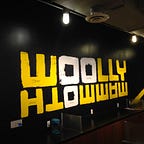The State of Improv
I first started out learning and performing improvisational comedy in, of all places, Hawaii.
This was in the mid-‘90s. I met someone, R. Kevin Doyle, who was heavily involved in Hawaii’s theater scene (and who still is) who had gone to Chicago and taken a class at the legendary improv comedy theater Second City, taught by someone who had spent years studying under the art form’s primary guru, Del Close.
Back then, the esoteric nature of improvisation made it difficult to, well, “locally source.” This was before the internet, before YouTube, before one’s ability to simply, out of curiosity, throw a few keywords like “improv comedy” into a search field and immediately access tons of information, insight, instructional videos, and — better still — videos of troupes actually performing in front of live audiences. Even more difficult back then? Finding people actually interested in doing it, even in one’s own community.
Miraculously, I managed to discover improv and found a few other people equally as interested in pursuing it, one of whom, again, was R. Kevin, my first improv teacher. His goal was to teach a class or two to the uninitiated, hold rehearsals, and then see if we actually couldn’t perform this strange, nebulous thing in front of an audience. After a few months, there were about eight of us rehearsing, working, and learning. Finally, we ended up performing.
Our audiences were small then, but cultishly supportive and receptive. But, even during performances, our lift was heavy: we first had to contextualize what it is we were doing, explaining to the audience that everything in the show was made up in the moment — no scripts. And then perform. And that’s how things were for a long time, even in large metropolitan areas: performers explaining and contextualizing improv for uninitiated audiences, many of which had no idea what they were about to see.
Much has changed, obviously. Improv has grown from obscure art form to a force in both comedic and national culture. Not only does it no longer have to be explained, but today’s younger generation essentially grew up on a diet of improv comedy. As well, the art form has continued to explode nationally. Specifically:
· The Upright Citizens Brigade (UCB) has grown from one small theater in the Chelsea district of NYC to multiple theaters in NYC and LA, and UCB has become the launching pad for some of the most gifted performers and writers: artists who have become household names.
· The annual Del Close Marathon, named in honor of the improv guru mentioned above and once housed entirely in that small theater, recently celebrated its 20th anniversary, with shows and content featuring hundreds of troupes and acts and spanning multiple performance spaces in NYC. In addition, UCB will be relocating the festival to LA starting next year.
· Both The Second City Theater and iO Theater in Chicago, as well as The Groundlings in LA, continue to provide platforms for cultivating and bringing comedic talent to the forefront of the national comedy scene.
· Here in Washington, DC, there are now two brick-and-mortar theaters devoted exclusively to improvisational comedy in all its forms; in addition, multiple festivals, annual events, and tent-pole content highlight local talent. There are also multiple opportunities for instruction at all levels here in the metro area.
More importantly, improv has also grown throughout the country — not just in major metropolitan areas, but also in smaller cities as well. There are now active brick-and mortar improv theaters in Tulsa, Columbus, and Tampa, for example. Even Bloomington, 17 miles south of where I grew up in southern Indiana, offers opportunities both to see improv shows and to take classes.
At the same time, public and private organizations of all shapes and sizes, from Fortune 500 companies to start-ups, non-profits, and NGOs, are now discovering the critical fact that the principles that inform improv comedy — seamless collaboration, agreement, listening and “being present” — can help their employees be better colleagues and leaders. They regularly bring improv instructors on site to teach their teams these principles. (And, yeah, have fun in the process.)
That’s a lot of growth and momentum, as well as fun and laughter, in such a short period of time. I’m glad to be a part of this global movement, and (more importantly) I’m glad for the friends and opportunities I’ve made along the way in a journey that, for me, began on an island in the middle of the Pacific Ocean nearly 25 years ago.
— — — — — — — — — —
Shawn Westfall has been performing improv comedy for nearly 25 years, and teaching it for over15 years. He helped found the improv comedy curriculum at The DC Improv, where he was the exclusive teacher of improv comedy for more than 14 years, teaching classes in beginning improv, advanced short-form and long-form improv, as well as improv workshops focusing on character, long form, and non-traditional improv techniques. He’s a co-founder of DC’s The Unified Scene Theater, where he also serves as artistic director. In addition, he runs a consultancy, Commedia Partners, that provides on-site corporate and organizational events that unleash the fun, power and tools of improvisational comedy to help foment creativity, build camaraderie, enhance communication skills, create and cement teams, and allow organizations to re-envision themselves and their people. As an ambassador for DC’s improv scene, Shawn is partnering with Woolly for our production of the Upright Citizens Brigade Theatre’s DAMNED IF YOU DO, running July 10–29.
